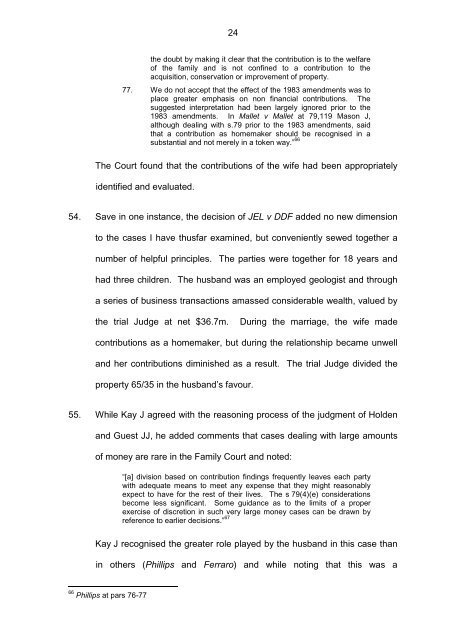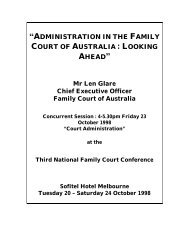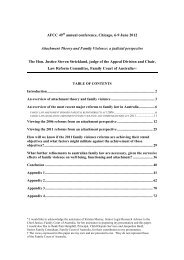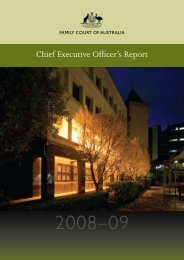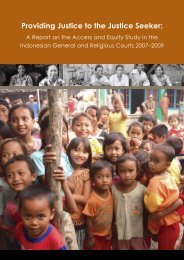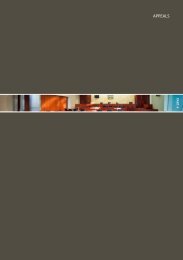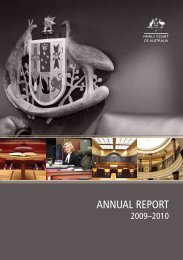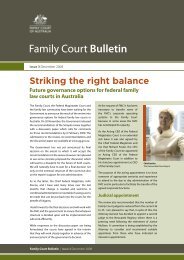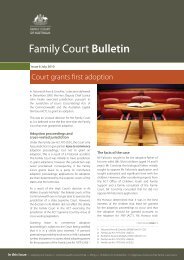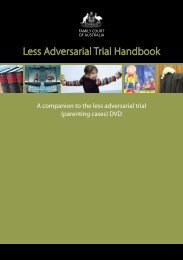23where assets were valued in <strong>the</strong> tens <strong>of</strong> millions. Having consideredFerraro, Whiteley and McLay, <strong>the</strong> Full <strong>Court</strong> found:“In <strong>the</strong> instant case, <strong>the</strong> application <strong>of</strong> <strong>the</strong> skills <strong>of</strong> <strong>the</strong> husband, hisingenuity and enterprise produced assets in <strong>the</strong> medium ra<strong>the</strong>r than <strong>the</strong>high range as in <strong>the</strong> three authorities we have referred and, in our view,<strong>the</strong> trial Judge erred in concluding that his contribution had <strong>the</strong> qualitydescribed in <strong>the</strong> authorities as special or extra or as she found as beingextraordinary. Thus, although conscious <strong>of</strong> <strong>the</strong> finding <strong>of</strong> <strong>the</strong> trial Judge,that “[A]n analysis <strong>of</strong> <strong>the</strong> parties’ net worth and <strong>the</strong> facts between 1985and separation reveal that <strong>the</strong> assets have been acquired largely through<strong>the</strong> husband’s efforts”, we are <strong>of</strong> <strong>the</strong> view that, in assessing <strong>the</strong> totality <strong>of</strong><strong>the</strong> contributions <strong>of</strong> <strong>the</strong> parties, her Honour attached too much weight to<strong>the</strong> financial contributions <strong>of</strong> <strong>the</strong> husband and his efforts in <strong>the</strong> acquisition<strong>of</strong> <strong>the</strong> property.” 6352. In Phillips v Phillips, 64 <strong>the</strong> parties were married for 31 years and at <strong>the</strong> time<strong>of</strong> <strong>the</strong> hearing <strong>the</strong>re were two adult children born <strong>of</strong> <strong>the</strong>ir union. Bothparties worked during <strong>the</strong> marriage and <strong>the</strong> wife’s steady wage allowed <strong>the</strong>husband to make <strong>the</strong> move to self employment. The trial Judgerecognised <strong>the</strong> husband’s special contribution and <strong>the</strong> Full <strong>Court</strong> affirmed:“It was open to her Honour, on <strong>the</strong> evidence, to find that <strong>the</strong> husband’scontributions were greater than those <strong>of</strong> <strong>the</strong> wife after <strong>the</strong> establishment<strong>of</strong> <strong>the</strong> Villa World Project. The project was established approximately 10years prior to separation <strong>of</strong> <strong>the</strong> parties. … However, it is also said that <strong>the</strong>wife’s role was more passive than active. Her Honour did not overweighfinancial contributions against non-financial contributions. Fur<strong>the</strong>r, we arenot persuaded that her Honour credited <strong>the</strong> husband with <strong>the</strong> effortsmade by o<strong>the</strong>rs. Her Honour identified <strong>the</strong> greater contribution by <strong>the</strong>husband and did not, in evaluating this contribution, and determining <strong>the</strong>weight to be attached to it, “over value” <strong>the</strong> husband’s contribution. In ouropinion, what her Honour did was identify <strong>the</strong> respective contributions <strong>of</strong><strong>the</strong> parties and evaluate <strong>the</strong>se contributions. Her Honour came to <strong>the</strong>conclusion that <strong>the</strong> husband’s contributions were greater than those <strong>of</strong><strong>the</strong> wife.” 6553. The Full <strong>Court</strong> also discussed <strong>the</strong> legislative reform which had occurredafter <strong>the</strong> decision in Mallet. The changes, <strong>the</strong>y found, did not expand on<strong>the</strong> legislation nor did <strong>the</strong>y overrule Mallet.“76. The <strong>Family</strong> Law Amendment Act 1983 inserted s.79(4)(c). Priorto 1983 <strong>the</strong>re had been provision in s.79 recognising <strong>the</strong>contribution <strong>of</strong> a party as homemaker and parent. However, <strong>the</strong>drafting left it open to argument that such contributions had to berelated to <strong>the</strong> property <strong>of</strong> <strong>the</strong> parties. The amendment resolved63 Stay v Stay (1997) FLC 92-751 at pp 84,131-264 [1998] FamCA 1551; Ellis, Kay and O’Ryan JJ65 Phillips at par 73
24<strong>the</strong> doubt by making it clear that <strong>the</strong> contribution is to <strong>the</strong> welfare<strong>of</strong> <strong>the</strong> family and is not confined to a contribution to <strong>the</strong>acquisition, conservation or improvement <strong>of</strong> property.77. We do not accept that <strong>the</strong> effect <strong>of</strong> <strong>the</strong> 1983 amendments was toplace greater emphasis on non financial contributions. Thesuggested interpretation had been largely ignored prior to <strong>the</strong>1983 amendments. In Mallet v Mallet at 79,119 Mason J,although dealing with s.79 prior to <strong>the</strong> 1983 amendments, saidthat a contribution as homemaker should be recognised in asubstantial and not merely in a token way.” 66The <strong>Court</strong> found that <strong>the</strong> contributions <strong>of</strong> <strong>the</strong> wife had been appropriatelyidentified and evaluated.54. Save in one instance, <strong>the</strong> decision <strong>of</strong> JEL v DDF added no new dimensionto <strong>the</strong> cases I have thusfar examined, but conveniently sewed toge<strong>the</strong>r anumber <strong>of</strong> helpful principles. The parties were toge<strong>the</strong>r for 18 years andhad three children. The husband was an employed geologist and througha series <strong>of</strong> business transactions amassed considerable wealth, valued by<strong>the</strong> trial Judge at net $36.7m. During <strong>the</strong> marriage, <strong>the</strong> wife madecontributions as a homemaker, but during <strong>the</strong> relationship became unwelland her contributions diminished as a result. The trial Judge divided <strong>the</strong>property 65/35 in <strong>the</strong> husband’s favour.55. While Kay J agreed with <strong>the</strong> reasoning process <strong>of</strong> <strong>the</strong> judgment <strong>of</strong> Holdenand Guest JJ, he added comments that cases dealing with large amounts<strong>of</strong> money are rare in <strong>the</strong> <strong>Family</strong> <strong>Court</strong> and noted:“[a] division based on contribution findings frequently leaves each partywith adequate means to meet any expense that <strong>the</strong>y might reasonablyexpect to have for <strong>the</strong> rest <strong>of</strong> <strong>the</strong>ir lives. The s 79(4)(e) considerationsbecome less significant. Some guidance as to <strong>the</strong> limits <strong>of</strong> a properexercise <strong>of</strong> discretion in such very large money cases can be drawn byreference to earlier decisions.” 67Kay J recognised <strong>the</strong> greater role played by <strong>the</strong> husband in this case thanin o<strong>the</strong>rs (Phillips and Ferraro) and while noting that this was a66 Phillips at pars 76-77


